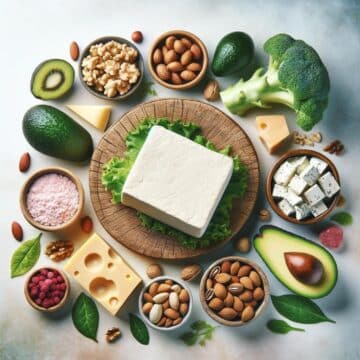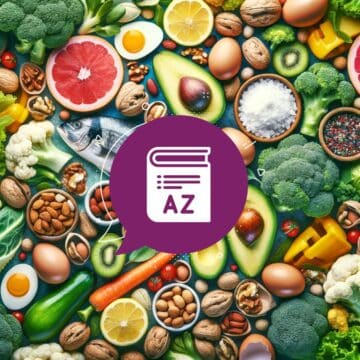As keto dieters, we’re constantly talking about fat. Fat, fat, fat, then carbs, and net carbs. But there’s another macronutrient we don’t talk about very often, and that’s protein. What’s the deal with protein and the ketogenic diet? Protein is often forgotten about in the keto world, so today we’re going to clear up the role of protein on keto. We’ll also introduce you to keto protein powder as a source of keto protein, and of course how to use it to make keto desserts and baked goodies!
Keto refresher
The goal with the keto diet is to get most of our calories (70-80%) from fat to put the body in a state of ketosis. Ketosis has many powerful health benefits from assisting with weight loss to improving cardiovascular disease, diabetes, sleep, mental health, and more. In ketosis, the body uses fat as the main source of energy instead of carbohydrates, since we are also keeping daily carbohydrate intake below 50 grams.
Protein and Ketosis
First, let’s remember that while following the keto diet, we aim to keep our protein intake at 25% or less of our caloric intake. We want to be focusing on fat intake, so although protein is absolutely necessary for vital bodily functions, we need to keep it that low to force the body to use fat as its main energy source. So bring on the fat‼
Then how do I build muscle on ketosis?
Many people are curious about building muscle on the keto diet. This is important for the weight lifters, the cross-fit trainers, the high-intensity-interval-trainers, and people who do burst-of-energy anaerobic exercising. We know our muscles are made of protein, so if we’re doing these demanding exercises but consuming a diet that’s mostly fat, how is it possible to build muscle? The answer here might surprise you, but here it is: it’s okay to increase your protein on keto! Protein is not something to be scared of, and here’s why.
Importance of protein for keto exercisers
As we said, don’t be afraid of protein! A lot of keto dieters out there worry about protein knocking them out of ketosis because they hear it can break down into glucose in the body. This is true, but it’s no reason to worry! If you’re exercising a lot with these burst-type workouts, your body needs quick energy. Fat takes a long time to be converted to usable energy, so for anaerobic exercise, the body has to use glucose, the fastest source of energy. As low carb keto dieters, we don’t get much glucose from our diets. This is why protein-induced glucose synthesis is so important! We need the glucose from broken-down protein to provide a source of quick energy when we’re working out that fat can’t provide.
Protein helps reach fitness goals
Here are some other reasons why protein is so crucial for fitness gurus. First, it’s responsible for the storage of lean body mass. Research shows that protein does not increase fat storage, and instead, it helps boost metabolism and build lean muscle. Second, protein repeatedly shows to be the most satiating type of food. Yes, fat can hold us over for a long time, but scientists repeatedly see that protein is better at moderating appetite. So the satiety effect of protein will help you with weight loss, even if you’re ketogenic. Another advantage to protein is that it’s lower in calories than fat so if you are trying to lose weight while building muscle on keto, the protein will be an important tool in allowing you to reach your diet goals.
Protein for keto weight loss plateaus
Many people, often women, turn to the keto diet for its weight loss benefits. If you do not see results, or if you start losing weight on keto but hit a plateau, the answer could be to increase your protein intake. If you are primarily eating fat, that’s great for ketosis, but if it’s too much, the body will never get a chance to use stored fat reserves for energy. It will always be using the incoming fat from what you’re eating. So increasing protein, in this case, forces the body to turn to stored fat and move you along towards your weight loss goals.
The ketosis advantage in building muscle
As keto dieters, we have an extra level of protection that helps us maintain muscle. Being in ketosis means the body is producing ketones. Ketones are what form when it breaks down fat into fuel. You can read our blog post about ketosis and ketones here. Ketones are anti-inflammatory. Frequently, inflammation in the body causes protein and muscle breakdown, but for us, the anti-inflammatory ketones prevent this. That shows how our ketones help maintain muscle.
Protein powder for a keto protein boost
Now we understand that extra protein can be okay on keto, especially if we have fitness goals. One way to efficiently increase your protein on keto without increasing your calories a ton is protein powder. Protein powder is easy to incorporate into your diet, and we love it because it’s also easy to use for keto baking and desserts! You can also blend it with water for a simple protein drink, or mix it into your favorite smoothie recipe. Keep on reading to see how we use keto protein powder at My Sweet Keto!
How to choose a keto protein powder
The most important thing to look out for when selecting a keto protein powder is the amount of carbs. Most protein powders are naturally low in carbs since they’re just an isolated type of protein. Yet sometimes they do have a surprising amount of sugar, especially if they’re flavored. Always, always, check the ingredients list and the nutrition facts to make sure there aren’t extra carbs hiding out in your protein!
Collagen is a great keto-friendly protein because it has lots of other health benefits. It’s the most abundant type of protein found in the body, and it’s excellent for hair, skin, joint, nail, and digestive health. It’s also very easy to digest, so it feels good in your body! This is one type of keto collagen protein that we like at My Sweet Keto. Whey is another type of protein that’s scientifically proven to build muscle efficiently. Whey is a protein found in dairy, so if you are allergic to dairy, it’s best to choose another type of protein. Another disadvantage to whey is that it raises insulin more than other types of protein, so if your goal is to be very low carb, it wouldn’t be the best option for you. Plant-based keto proteins also exist! You can find pea and/or brown rice-based protein powder on Amazon. Moreover, you can find dairy-free beef protein on the market, as well.
Protein powders will all vary in protein, carbohydrate, and net carb amounts depending on the type of protein and the brand, so make sure you read labels to find one that meets your keto macronutrient needs.
Delicious keto desserts with protein powder
Here are some “sweet” keto ways we love to use protein powder. If you’re exercising a lot, why not use your dessert to get that extra protein in? One way we use protein powder is to make these fantastic low-carb blueberry cheesecakes. We also use it in our keto white chocolate cake, which is a great refreshing treat for the summer. Our avocado mug cake uses protein powder too. If you need a protein boost because you’re sick or recovering from an injury, add some protein powder to this keto porridge. Last but not least, the simplest way to get in that keto protein is our homemade keto protein bar recipe. It’s so easy and allows you to control the amount of protein and fat you get from a protein bar.
Making peace with keto protein
We hope this clears up the confusion out there about protein on keto. If you’re exercising and expending a lot of energy, increasing your protein on keto is totally okay and should not ruin your ketosis. Protein is the key to achieving your fitness and diet goals while being keto! And with all of our protein powder recipes, it can be so delicious!








Stefanie says
Hi Tisa,
I was wondering if I can do the keto diet and donate plasma. I’m encouraged not to eat fatty foods , especially not the night before I will donate. I’m confused about what I should eat since keto is high fat. Is there an in between where it would be lower carbs but not too high fat? Thank you, your reply is very much appreciated.
Luka says
Thank you for your comment and for reaching out to us with your question. When it comes to donating plasma and dietary requirements, we strongly recommend that you consult with a medical professional or the blood donation center you plan to donate at for guidance. They can provide you with specific guidelines for what to eat and drink before donating based on your individual health needs.
That being said, we understand your concern about balancing a high-fat diet with the need to avoid fatty foods before donating. One possible solution could be to focus on leaner sources of protein, such as chicken, turkey, and fish, and incorporating more low-carb vegetables into your meals. This can help reduce your overall fat intake while still maintaining a low-carb, keto-friendly diet.
Again, we recommend speaking with a medical professional for personalized guidance on what to eat before donating plasma. Thank you for your comment, and we wish you the best of luck on your keto journey.